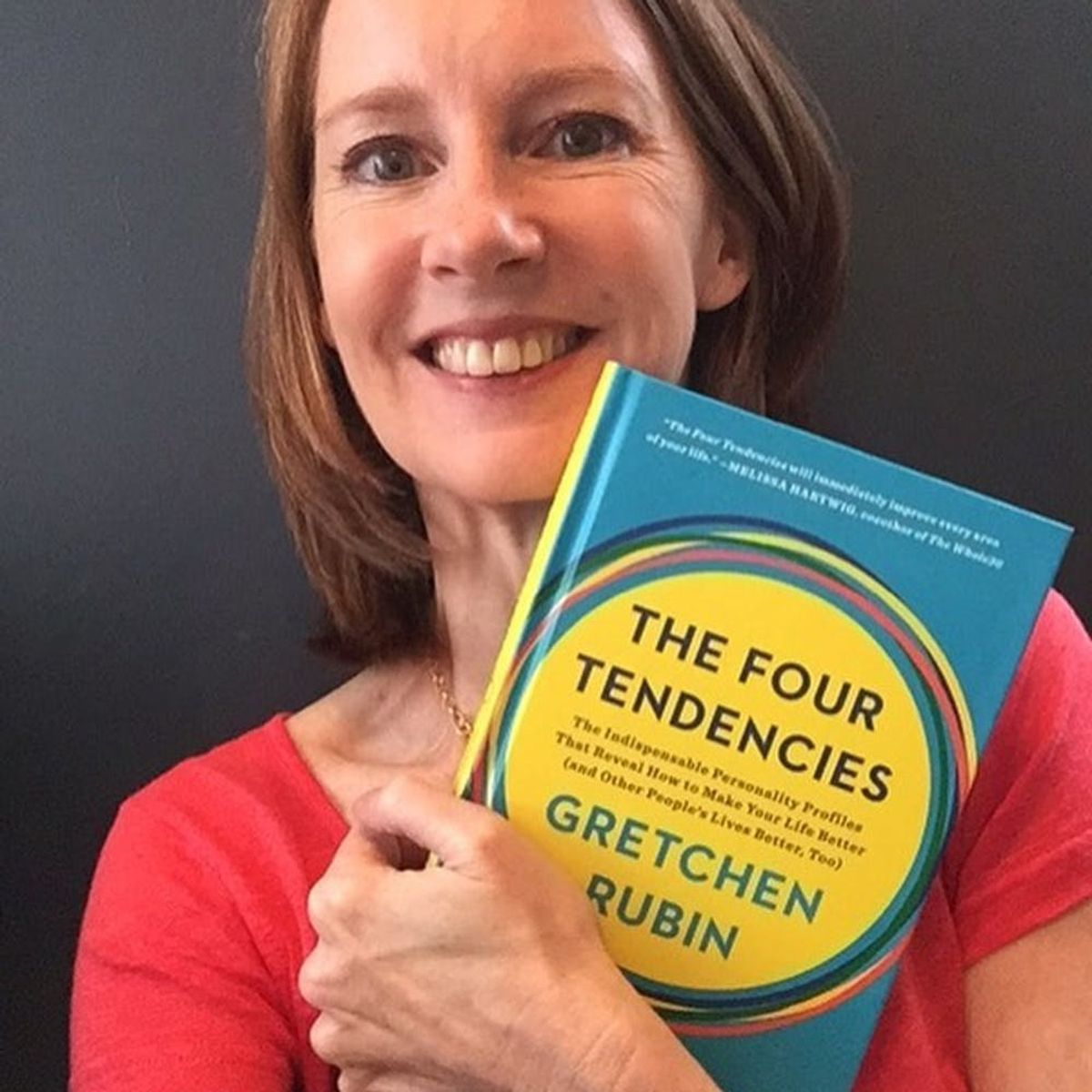Knowing This One Thing Might Make You a Better Friend, Partner, and Coworker

Ever wonder what’s holding you back from being a better communicator, collaborator, friend, or partner? New York Times bestselling author Gretchen Rubin knows a thing or two about harnessing the power of our unique experiences, personality traits, and creativity to live a more productive and happy life. Her beloved podcast, Happier With Gretchen Rubin, is dedicated to talking about good habits and healthy hacks, and her new book, The Four Tendencies, introduces a brand-new framework to help people understand how they respond to expectations so they can live a happier life. We chatted with Rubin during her recent stop at Scribd, where she popped in for a live Q&A along her San Francisco book tour. Read on to learn more about the four Tendency types and which one you may be.
Brit + Co: We loved your books The Happiness Project and Better Than Before. What inspired you to put together the “Four Tendencies” framework? What is a “Tendency”?
Gretchen Rubin: I put together the framework based on patterns I noticed when speaking to individuals during years of researching and writing about happiness and behavior. I often heard, “When someone tells me to do something, immediately I don’t want to do it.” Many others told me, “I can always make time for other people, but I can never take time for myself.” I was surprised to hear the same frustrations from so many people and also wanted to know why they didn’t ring true for me. I realized that these struggles stemmed from the answer to a simple question: How do you respond to expectations?
View this post on InstagramA post shared by Gretchen Rubin (@gretchenrubin) on
We all face outer expectations (like a work deadline) and inner expectations (like a New Year’s Resolution). How we respond to them is our Tendency. They are:
- Upholders respond readily to outer and inner expectations (I’m an Upholder, 100 percent).
- Questioners question all expectations; they’ll meet an expectation if they think it makes sense — essentially, they make all expectations into inner expectations.
- Obligers meet outer expectations but struggle to meet expectations they impose on themselves.
- Rebels resist all expectations, outer and inner alike.
Whenever I describe the four types to people, they almost immediately know their Tendency and the Tendency of many people in their lives.
B+C: This is fascinating. How does knowing your Tendency change the way you interact with friends?
GR: Our Tendency shapes every aspect of our behavior, so understanding this framework lets us make better decisions, meet deadlines, suffer less stress and burnout, and engage more effectively with other people. When we understand the Four Tendencies, we become more tolerant and compassionate of the way others operate. It’s helpful to remember that when someone responds to an expectation differently from us, it has nothing to do with the value they place on your relationship — it’s simply their nature.
In any relationship, it’s important to be aware of your Tendency and those of the people around you. Upholders are the least common tendency, and their self-motivation and the ease at which they set and conquer goals for themselves can cause their friends to become self-critical or resentful. Don’t compare yourself to them — they are the rare ones! Feel empowered to take actions that will help motivate you and ensure your success.
B+C: This makes so much sense! Can you share an example to showcase how Tendencies might function in a romantic relationship?
GR: I’m an Upholder and my husband is a Questioner. Understanding this frames the way in which we communicate and helps prevent frustration. For example, I know that when my husband asks questions about a decision, it’s not coming from a judgment or a lack of trust — it’s simply in his nature to want to understand the “why” behind decisions. Before understanding this, I would often feel drained by his questions, and he would feel frustrated by my response.
B+C: You point out that there’s a power in knowing your Tendency in professional situations too. Most of us have experienced frustrating moments at work, whether they were with a tricky teammate or a bad boss. How can various Tendencies work together to accomplish goals and achieve success?
GR: Understanding and embracing each team member’s Tendency leads to more productivity and less conflict. For instance, say you’re the boss of a Rebel and an Obliger and you need both of them to turn in an assignment. You will get your best work out of them if you adjust the way in which you delegate assignments and share expectations. The Obliger needs accountability, and they will appreciate deadlines and oversight. Rebels are resistant to reminders and structure; they will do their best work when they can develop their own processes.
A boss or a colleague of a Questioner might mistake their curiosity as insubordination or stubbornness — but they are just trying to get their questions answered. Upholders can often get impatient with people’s questions, or with their need for accountability, or with their resistance. When they see that they function differently from the majority of others, they can have much more productive relationships.
View this post on InstagramA post shared by Gretchen Rubin (@gretchenrubin) on
B+C: How has knowing your Tendency changed the way you personally interact with others each day?
GR: My relationships are much richer and more productive, and I have a better understanding of my own strengths and weaknesses. As an Upholder, for instance, I am able to easily set and accomplish goals. There were times when I would be judgmental or impatient with others who didn’t operate in the same way. That kind of thinking can lead to resentment and conflict. Since I identified these Tendencies and recognized that I’m not like everyone else, I’ve become much more accepting of others habits and ways of being. Knowing your Tendency can help you make better decisions, and it’s important to consciously discuss your tendencies in an open and safe dialogue.
Want to know which Tendency you are? Find out with Gretchen Rubin’s online quiz and share your results with us on Twitter @BritandCo!
Brit + Co may at times use affiliate links to promote products sold by others but always offers genuine editorial recommendations.
(Featured photo via @gretchenrubin)



















